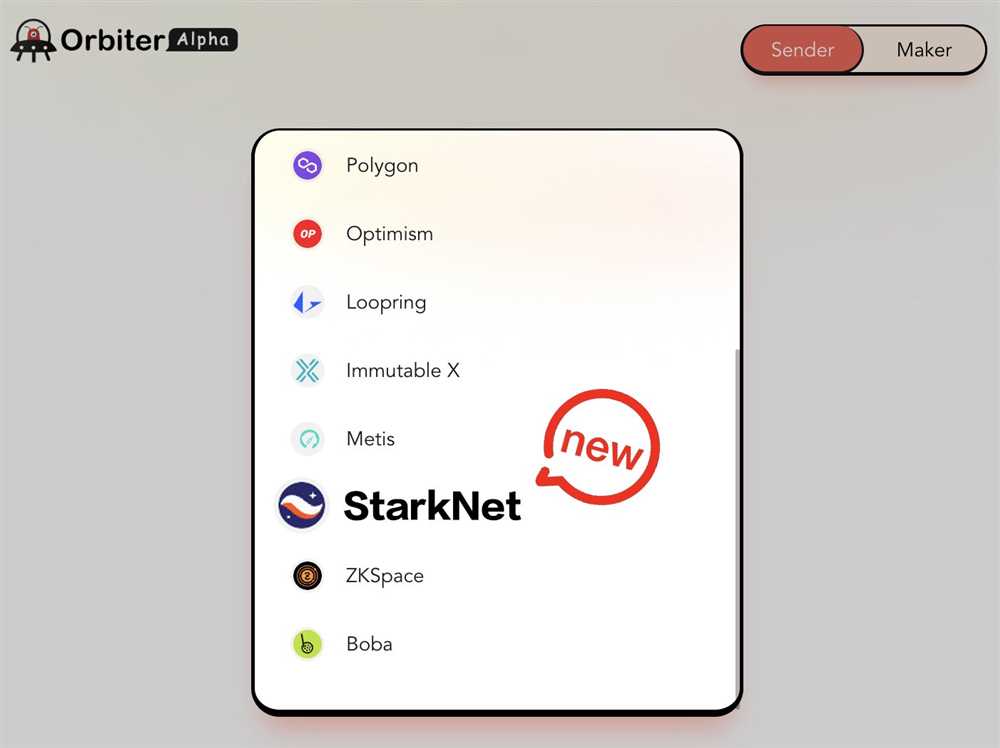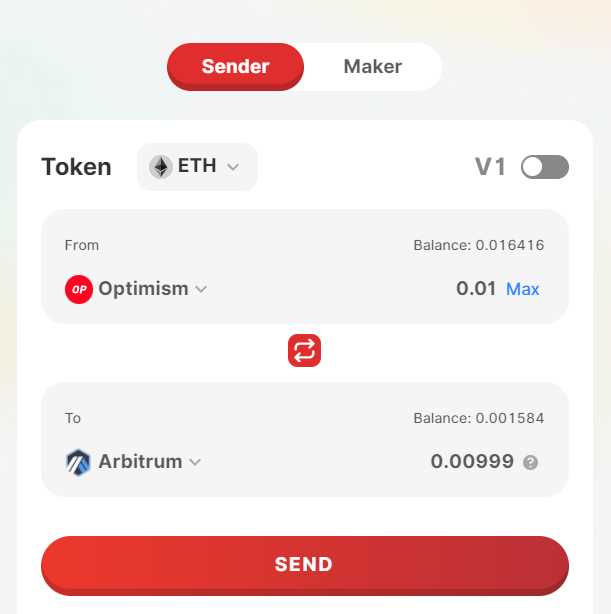
Diving into the Technology underpinning Orbiter Finance’s Decentralized Infrastructure

As the world of finance continues to evolve, decentralized infrastructure solutions are becoming increasingly important. One such solution is Orbiter Finance, a cutting-edge platform that leverages decentralized technologies to provide a secure and efficient financial ecosystem.
At its core, Orbiter Finance utilizes blockchain technology to create a decentralized infrastructure. This technology allows for the secure and transparent recording of financial transactions, eliminating the need for intermediaries and enabling peer-to-peer transactions. By removing centralized authorities, Orbiter Finance aims to democratize access to financial services and empower individuals.
One of the key benefits of Orbiter Finance’s decentralized infrastructure is its ability to provide greater security and privacy. Through the use of blockchain, all transactions are recorded on a distributed ledger, making it nearly impossible to alter or manipulate data. This ensures the integrity of the financial system and protects users’ assets from fraud or theft.
Moreover, Orbiter Finance’s decentralized infrastructure also offers enhanced efficiency. Traditional financial systems often suffer from lengthy settlement times and high transaction fees. With Orbiter Finance, transactions can be executed in a matter of seconds, and the associated fees are significantly reduced. This not only improves the user experience but also opens up new opportunities for businesses and individuals to engage in frictionless financial activities.
In conclusion, Orbiter Finance’s decentralized infrastructure is a game-changer in the world of finance. By harnessing the power of blockchain technology, Orbiter Finance provides a secure, efficient, and transparent financial ecosystem. With its focus on democratizing access to financial services, Orbiter Finance is poised to revolutionize the way we interact with money.
Overview of Orbiter Finance

Orbiter Finance is a decentralized finance (DeFi) project that aims to revolutionize the way financial systems operate. Built on the Ethereum blockchain, Orbiter Finance provides users with a transparent, secure, and efficient platform for managing their assets.
At its core, Orbiter Finance is powered by smart contracts, which are self-executing contracts with predefined rules and conditions. These smart contracts enable automated and decentralized transactions, eliminating the need for intermediaries and reducing the risk of fraud or manipulation.
One of Orbiter Finance’s key features is its liquidity pools, which allow users to lend, borrow, and earn interest on their assets. By pooling funds together, users can access liquidity at competitive rates and earn passive income from their investments.
Orbiter Token (ORB)

The Orbiter Token (ORB) is the native cryptocurrency of the Orbiter Finance ecosystem. ORB holders have various privileges and incentives within the platform, such as voting rights for governance decisions and access to exclusive features.
In addition to governance and utility, ORB serves as a key component in the Orbiter Finance network’s economic model. Token holders can stake their ORB to earn rewards and participate in network consensus, ensuring the security and decentralization of the platform.
Partnerships and Integrations

Orbiter Finance has forged strategic partnerships with leading DeFi projects and protocols to enhance its offerings and expand its reach. These partnerships enable seamless integrations with other platforms, allowing for cross-chain interoperability and access to a wider range of services.
Furthermore, Orbiter Finance actively collaborates with developers and community members through its open-source model. This approach fosters innovation and ensures that the platform evolves to meet the changing needs of its users.
| Benefits | Features |
|---|---|
| Transparency | Secure Smart Contracts |
| Efficiency | Liquidity Pools |
| Incentives | ORB Token |
| Partnerships | Integrations |
Decentralized Finance (DeFi)

Decentralized Finance (DeFi) is a term used to describe the merging of traditional financial systems with distributed ledger technologies, such as blockchain. It aims to provide an open and transparent financial ecosystem that eliminates the need for intermediaries like banks and centralized exchanges.
In DeFi, financial products and services are built on smart contracts, which are self-executing contracts with conditions written directly into code. This allows for automated and trustless transactions, removing the need for traditional third-party oversight. Smart contracts also enable the creation of decentralized applications (DApps), which can facilitate lending, borrowing, trading, and other financial activities.
Key Features of DeFi

1. Transparency: DeFi operates on public blockchains, allowing for complete transparency and visibility of transactions and contracts. Anyone can view and verify the code and transactions, ensuring fairness and accountability.
2. Permissionless: DeFi protocols are generally open to anyone with an internet connection. There are no gatekeepers, centralized authorities, or KYC (Know Your Customer) requirements, enabling financial inclusion for individuals who are unbanked or underserved by traditional banking systems.
3. Interoperability: DeFi protocols can be designed to interact and collaborate with each other, allowing for the seamless transfer of assets and data across different platforms and applications. This interoperability opens up a wide range of possibilities for innovation and the creation of new financial products and services.
Advantages and Challenges of DeFi

Advantages: DeFi offers several advantages over traditional financial systems. It provides greater financial access and inclusion, increased transparency and security, faster and more efficient transactions, and the potential for higher yields through various investment opportunities.
Challenges: DeFi is not without its challenges. The technology is still relatively new and undergoing rapid development, leading to potential security vulnerabilities and risks. There are also concerns about regulatory compliance and the lack of user-friendly interfaces for non-technical users. However, as DeFi continues to evolve, these challenges are being addressed and innovative solutions are being developed.
In summary, DeFi represents a paradigm shift in the way financial systems operate by leveraging blockchain technology and smart contracts. It has the potential to revolutionize traditional finance, making it more accessible, transparent, and efficient for individuals and businesses worldwide.
Blockchain Technology

Blockchain technology is at the core of Orbiter Finance’s decentralized infrastructure. It is a distributed ledger system that allows for transparent and secure transactions. A blockchain consists of a chain of blocks, where each block contains a list of transactions. These transactions are verified by a network of computers, known as nodes, that work together to validate and record the transactions.
One of the key features of blockchain technology is its decentralized nature. Unlike traditional centralized systems, a blockchain is maintained by a network of participants, rather than a single central authority. This makes it highly resistant to censorship and third-party interference.
Another important aspect of blockchain technology is its immutability. Once a transaction is recorded on the blockchain, it cannot be altered or deleted. This ensures the integrity of the data and provides a historical record that can be audited and verified.
Blockchain technology also enables transparency. Anyone can view the transactions recorded on the blockchain, allowing for greater accountability and trust. This transparency is particularly valuable in the context of financial systems, where trust and security are paramount.
Furthermore, blockchain technology enables smart contracts, which are self-executing contracts with the terms of the agreement directly written into the code. These contracts are stored on the blockchain and automatically execute when the predetermined conditions are met. Smart contracts eliminate the need for intermediaries and can streamline complex business processes.
In summary, blockchain technology is the foundation of Orbiter Finance’s decentralized infrastructure. It provides transparency, immutability, and decentralization, making it an ideal solution for creating a secure and reliable financial ecosystem.
Smart Contracts and Decentralized Applications (DApps)

Smart contracts are self-executing contracts with the terms of the agreement directly written into code. They automatically execute and enforce the terms of the contract without the need for intermediaries. This is made possible by utilizing blockchain technology, which allows for transparent and immutable transactions.
Decentralized applications, also known as DApps, are applications that run on a decentralized network rather than a single central server. They leverage smart contracts to provide a more secure and transparent way of conducting transactions and interactions. DApps can range from decentralized finance (DeFi) platforms to decentralized social media networks.
One key feature of DApps is that they are open-source, meaning that anyone can view and contribute to the code. This fosters innovation and collaboration within the decentralized community. Additionally, DApps are typically interoperable, which means they can interact with other DApps and exchange data seamlessly.
Another important aspect of DApps is their decentralized nature. Unlike traditional applications that rely on a central authority, DApps are powered by a network of decentralized nodes. This eliminates the need for a single point of failure and provides enhanced security and censorship resistance.
Furthermore, DApps often have their own native tokens or cryptocurrencies that are used for various purposes within the application ecosystem. These tokens can represent ownership rights, governance rights, or simply be used as a medium of exchange.
In summary, smart contracts and decentralized applications (DApps) are innovative technologies that leverage blockchain to provide more secure and transparent solutions. They enable automated and trustless execution of agreements and offer a new paradigm of decentralized computing.
Benefits of Orbiter Finance’s Decentralized Infrastructure

Orbiter Finance’s decentralized infrastructure offers several key benefits that make it standout in the blockchain space:
1. Increased Security: By leveraging blockchain technology and a decentralized network, Orbiter Finance’s infrastructure provides enhanced security compared to traditional centralized systems. The distributed nature of the network ensures that there is no single point of failure, making it more resistant to hacking and other cyber threats.
2. Improved Transparency: Transparency is a crucial aspect of decentralized finance, and Orbiter Finance’s infrastructure excels in this regard. Every transaction on the network is recorded on the blockchain, making it easily traceable and auditable. This level of transparency helps to prevent fraud and ensures that users can trust the integrity of the system.
3. Lower Costs: Traditional financial systems often involve intermediaries and third parties, which can add unnecessary costs. With Orbiter Finance’s decentralized infrastructure, these intermediaries are eliminated, reducing transaction fees and other expenses. This makes it more cost-effective for users to participate in decentralized finance and eliminates the need for expensive intermediaries.
4. Increased Accessibility: By leveraging blockchain technology, Orbiter Finance’s infrastructure opens up decentralized finance to a wider audience. Anyone with an internet connection can access and participate in the network, regardless of their geographical location or financial status. This increased accessibility helps to promote financial inclusion and empowers individuals who were previously excluded from traditional financial systems.
5. Enhanced Privacy: Privacy is a growing concern in the digital age, and Orbiter Finance’s decentralized infrastructure addresses this issue. While all transactions are recorded on the blockchain, users can still enjoy a certain level of privacy, as their personal information is not directly linked to their transactions. This helps to protect user privacy while still maintaining the integrity and transparency of the system.
These benefits establish Orbiter Finance’s decentralized infrastructure as a secure, transparent, cost-effective, accessible, and privacy-preserving solution for decentralized finance.
Q&A:
What is Orbiter Finance?
Orbiter Finance is a decentralized infrastructure that aims to revolutionize the way financial transactions are conducted. It is built on the Ethereum blockchain and utilizes smart contracts to enable secure, transparent, and efficient transactions.
How does Orbiter Finance work?
Orbiter Finance works by leveraging blockchain technology to provide a decentralized financial ecosystem. It uses smart contracts to automate and execute transactions, eliminating the need for intermediaries and reducing the risk of fraud. Users can participate in the ecosystem by staking their crypto assets and earning rewards.
What are the benefits of using Orbiter Finance?
Using Orbiter Finance offers several benefits. First, it ensures transparency and security in financial transactions by leveraging blockchain technology. Second, it eliminates the need for intermediaries, resulting in lower transaction costs. Lastly, it allows users to earn rewards through staking their crypto assets, creating a passive income stream.


